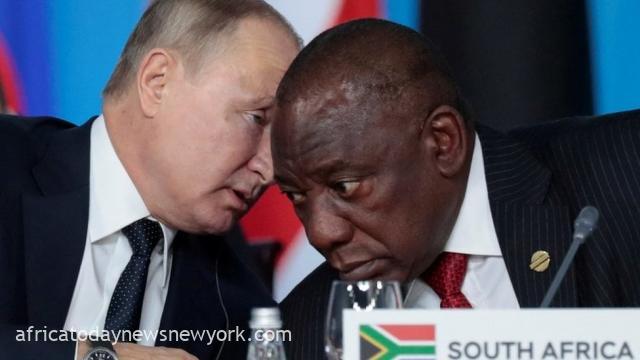Reports reaching the desk of Africa Today News, New York has it that South Africa has concluded plans to change its law to ensure that it has the power to decide whether or not to arrest a leader wanted by the International Criminal Court (ICC),
This was made known to newsmen by a deputy minister, Obed Bapela
This remark are coming amid intense speculation over whether South Africa stands by its invitation to Russia’s President Putin to visit in August.
Recall that the ICC had ealrier issued an arrest warrant for Mr Putin over the Ukraine war.
South Africa had earlier invited him to attend a summit of Brics leaders.
Russia has not said whether Mr. Putin plans to attend the summit.
Meanwhile, Pretoria has also granted diplomatic immunity to Russian officials attending, something that its foreign affairs department described as standard procedure.
Brics is intended to strengthen ties between the nations that make it up – Brazil, Russia, India, China and South Africa.
“In June we’ll be submitting the law in parliament,” Obed Bapela, a deputy minister in the South African presidency, told the BBC World Service’s Newshour programme.
Through the law, South Africa “will give itself exemptions of who to arrest and who not to arrest,” Mr Bapela said.
Africa Today News, New York reports that under its current laws, South Africa is obliged to arrest Mr Putin if he arrives on its shores, as it is a member of the ICC.
But South Africa has refused to condemn Russia’s invasion of Ukraine, insisting it wants to remain neutral.
The ICC issued its warrant for Mr Putin in March, accusing him of being responsible for war crimes – though Moscow has rejected such allegations.
South Africa’s main opposition party, the Democratic Alliance (DA), has launched a court application to compel the authorities to arrest Mr Putin should he arrive in August.
Mr Bapela said that South Africa was also writing to the ICC about a waiver.
This refers to article 98 of the Rome Statue, the treaty which established the court in 2002.
While article 27 says no-one is immune from prosecution by the ICC, article 98 appears to suggest that the ICC could not ask South Africa to arrest the Russian leader unless Russia agreed to waive Mr Putin’s immunity from prosecution.

